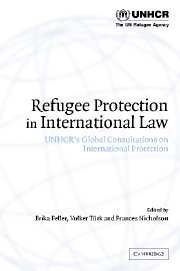Book contents
- Frontmatter
- Contents
- List of annexes
- Notes on contributors and editors
- Foreword
- Preface
- Acknowledgments
- Expert roundtables and topics under the ‘second track’ of the Global Consultations
- Table of cases
- Table of treaties and other international instruments
- List of abbreviations
- Part 1 Introduction
- Part 2 Non-refoulement (Article 33 of the 1951 Convention)
- Part 3 Illegal entry (Article 31)
- 3.1 Article 31 of the 1951 Convention Relating to the Status of Refugees: non-penalization, detention, and protection
- 3.2 Summary Conclusions: Article 31 of the 1951 Convention, expert roundtable, Geneva, November 2001
- 3.3 List of participants
- Part 4 Membership of a particular social group (Article 1A(2))
- Part 5 Gender-related persecution (Article 1A(2))
- Part 6 Internal protection/relocation/flight alternative
- Part 7 Exclusion (Article 1F)
- Part 8 Cessation (Article 1C)
- Part 9 Family unity (Final Act, 1951 UN Conference)
- Part 10 Supervisory responsibility (Article 35)
- Index
3.1 - Article 31 of the 1951 Convention Relating to the Status of Refugees: non-penalization, detention, and protection
Published online by Cambridge University Press: 28 August 2009
- Frontmatter
- Contents
- List of annexes
- Notes on contributors and editors
- Foreword
- Preface
- Acknowledgments
- Expert roundtables and topics under the ‘second track’ of the Global Consultations
- Table of cases
- Table of treaties and other international instruments
- List of abbreviations
- Part 1 Introduction
- Part 2 Non-refoulement (Article 33 of the 1951 Convention)
- Part 3 Illegal entry (Article 31)
- 3.1 Article 31 of the 1951 Convention Relating to the Status of Refugees: non-penalization, detention, and protection
- 3.2 Summary Conclusions: Article 31 of the 1951 Convention, expert roundtable, Geneva, November 2001
- 3.3 List of participants
- Part 4 Membership of a particular social group (Article 1A(2))
- Part 5 Gender-related persecution (Article 1A(2))
- Part 6 Internal protection/relocation/flight alternative
- Part 7 Exclusion (Article 1F)
- Part 8 Cessation (Article 1C)
- Part 9 Family unity (Final Act, 1951 UN Conference)
- Part 10 Supervisory responsibility (Article 35)
- Index
Summary
Article 31: refugees unlawfully in the country of refuge
Introduction
Article 31 of the 1951 Convention Relating to the Status of Refugees provides as follows:
1. The Contracting States shall not impose penalties, on account of their illegal entry or presence, on refugees who, coming directly from a territory where their life or freedom was threatened in the sense of Article 1, enter or are present in their territory without authorization, provided they present themselves without delay to the authorities and show good cause for their illegal entry or presence.
2. The Contracting States shall not apply to the movements of such refugees restrictions other than those which are necessary and such restrictions shall only be applied until their status in the country is regularized or they obtain admission into another country. The Contracting States shall allow such refugees a reasonable period and all the necessary facilities to obtain admission into another country.
Despite this provision, asylum seekers are placed in detention facilities throughout Europe, North America, and Australia, owing to their illegal entry or presence. In its July 2000 review of reception standards for asylum seekers in the European Union, UNHCR found several different types of detention in operation, including detention at border points or in airport transit areas, and that the grounds for detention also vary. For example, refugees and asylum seekers may be detained at the ‘pre-admission’ phase, because of false documents or lack of proper documentation, or they may be held in anticipation of deportation or transfer to a ‘safe third country’, for example, under the provisions of the Dublin Convention.
- Type
- Chapter
- Information
- Refugee Protection in International LawUNHCR's Global Consultations on International Protection, pp. 185 - 252Publisher: Cambridge University PressPrint publication year: 2003
- 10
- Cited by



